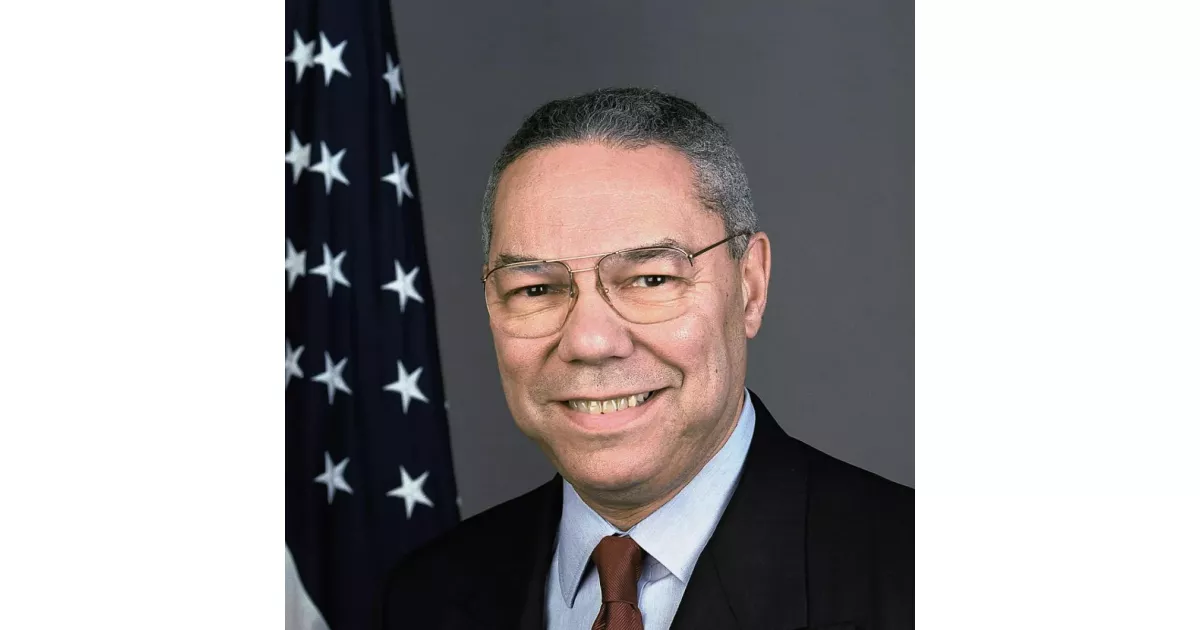How education and upbringing influenced the life of Colin Powell. A timeline of key moments.
Colin Powell (1937-2021) was a prominent American statesman and four-star general. He served as the 65th U.S. Secretary of State (2001-2005), the first African American to hold that position. Previously, he was National Security Advisor (1987-1989) and Chairman of the Joint Chiefs of Staff (1989-1993), the highest-ranking military officer in the U.S. Armed Forces. Powell's career was marked by his involvement in major foreign policy decisions and military operations from the Reagan to the George W. Bush administrations, though his presentation to the UN Security Council in 2003 regarding Iraq's alleged weapons of mass destruction remains controversial.
April 5, 1937: Colin Powell's Birth
On April 5, 1937, Colin Luther Powell was born. He later became an American diplomat and army officer.
1937: Birth in New York City
In 1937, Colin Powell was born in New York City to Jamaican immigrant parents. He was raised in the South Bronx.
1954: Graduation from Morris High School
In 1954, Colin Powell graduated from Morris High School.
1958: Commissioned as Second Lieutenant
In 1958, Colin Powell graduated from City College of New York and was commissioned as a second lieutenant.
1958: Bachelor of Science Degree
In 1958, Colin Powell received a Bachelor of Science degree in geology from the City College of New York.
August 1962: Colin Powell Marries Alma Johnson
On August 25, 1962, Colin Powell married Alma Johnson.
1963: Wounded in Vietnam
In 1963, while on patrol in Vietnam, Colin Powell was wounded after stepping on a punji stake, shortening his first tour.
1971: Master of Business Administration Degree
In 1971, Colin Powell earned a Master of Business Administration degree from George Washington University in Washington, D.C.
1971: MBA from George Washington University
In 1971, Colin Powell graduated from George Washington University with an MBA.
1975: Attended National War College
From 1975, Colin Powell attended the National War College, Washington, D.C.
1976: Attended National War College
Until 1976, Colin Powell attended the National War College, Washington, D.C.
July 1980: Effort to Upgrade Roy Benavidez's Medal
In July 1980, a soldier learned of the effort to upgrade Roy Benavidez's medal and provided the necessary sworn statement.
December 1980: Approval of Medal of Honor Upgrade
In December 1980, the upgrade of Roy Benavidez's medal to the Medal of Honor was approved, after Colin Powell advised President Ronald Reagan to present it.
1989: Opening of Lincoln Quote
In 1989, after becoming Chairman of the Joint Chiefs of Staff, Colin Powell opened a note that had been taped to the back of a framed quotation by President Abraham Lincoln that was given to him in 1979 when he was promoted to brigadier general. The note contained a prediction that Powell would become Chief of Staff of the United States Army.
1990: Honorary Doctorate
In 1990, Colin Powell received an honorary Doctor of Public Service from George Washington University.
1992: Potential Vice Presidential Nominee
In 1992, Powell was considered as a potential Democratic vice presidential nominee or even a replacement for Vice President Dan Quayle as the Republican vice presidential nominee.
1995: Becomes a Moderate Republican
From 1995, Colin Powell was a moderate Republican.
1995: Declared Republican
In 1995, Powell declared himself a Republican and began campaigning for Republican candidates.
1996: Decline to Run for President
In 1996, despite leading New Hampshire polls for the GOP nomination, Powell declined to run for president, citing a lack of passion for politics.
2000: Consideration as Presidential Candidate and Endorsement of George W. Bush
In 2000, Powell was mentioned as a potential candidate in the U.S. presidential election but decided against running. He later endorsed George W. Bush for president and spoke at the Republican National Convention.
2000: Statement about Saddam Hussein's Regime
In 2000, on the day he was nominated to be Secretary of State, Colin Powell told the press that Saddam Hussein was "sitting on a failed regime that is not going to be around in a few years time".
2001: Michael Powell Becomes FCC Chairman
In 2001, Colin Powell's son, Michael Powell, became the chairman of the Federal Communications Commission (FCC).
2003: Timing of U.S. Forces in Iraq Surge
In 2003, Powell concluded that a surge of U.S. forces in Iraq should have come sooner, perhaps in late 2003.
September 2004: Powell Describes Darfur Events as Genocide
In September 2004, Colin Powell labeled the events in Darfur as "genocide," making him the first cabinet member to use the term for an ongoing conflict.
November 2004: Resignation as Secretary of State
In November 2004, Colin Powell resigned from his position as Secretary of State shortly after George W. Bush was reelected, after Bush communicated his desire for Powell to resign via a phone call. Condoleezza Rice was nominated as his successor the following day.
2004: Comments on Neoconservatives
In 2004, Colin Powell reportedly referred to neoconservatives within the Bush administration as "fucking crazies" in a conversation with British Foreign Secretary Jack Straw.
April 2005: Expresses Reservations About John Bolton Nomination
In April 2005, after retiring from his role as Secretary of State, Colin Powell privately expressed reservations to Republican senators Lincoln Chafee and Chuck Hagel about the nomination of John Bolton as ambassador to the United Nations, but did not explicitly advise them to oppose Bolton.
April 2005: Accusations of Campaign Against Bolton
On April 28, 2005, an opinion piece claimed that Powell was "conducting a campaign" against Bolton due to past disagreements, including Bolton allegedly spying on Powell.
September 2005: Criticizes Response to Hurricane Katrina
In September 2005, Colin Powell criticized the response to Hurricane Katrina, suggesting that thousands of people, primarily the poor, were not adequately protected.
2005: Michael Powell ends term as FCC Chairman
In 2005, Colin Powell's son, Michael Powell, ended his term as the chairman of the Federal Communications Commission (FCC).
January 2006: Participates in White House Meeting
On January 5, 2006, Colin Powell participated in a White House meeting with former Secretaries of Defense and State to discuss United States foreign policy with Bush administration officials.
September 2006: Sides with Senate Republicans on Detainee Rights
In September 2006, Colin Powell sided with moderate Senate Republicans, supporting more rights for detainees and opposing President Bush's terrorism bill, expressing concerns about the moral basis of the fight against terrorism.
September 2006: Expresses Opposition to Military Tribunals
In a September 2006 letter to John McCain, Colin Powell voiced his opposition to President Bush's push for military tribunals of enemy combatants, objecting to redefining Common Article 3 of the Geneva Convention.
2007: Discusses Iraq War with President Bush
At the 2007 Aspen Ideas Festival in Colorado, Colin Powell stated that he had spent two and a half hours explaining to President Bush "the consequences of going into an Arab country and becoming the occupiers".
2007: Joins Revolution Health Board
In 2007, Colin Powell joined the board of directors of Steve Case's new company, Revolution Health and also served on the Council on Foreign Relations Board of directors.
2007: Donates to John McCain's Campaign
In the summer of 2007, Colin Powell donated the maximum allowable amount to John McCain's campaign.
October 2008: Praises Iraq Troop Surge and Iraqi Government
Following his endorsement of Barack Obama in October 2008, Colin Powell praised General David Petraeus and U.S. troops, as well as the Iraqi government, concluding that "it's starting to turn around".
October 2008: Endorses Barack Obama for President
On October 19, 2008, Colin Powell announced his endorsement of Barack Obama for President, citing his ability to inspire, inclusive campaign, and style, while also questioning McCain's choice of Sarah Palin as vice president.
December 2008: Reiterates Belief About Palin's Impact on Republican Party
In a December 12, 2008, interview, Colin Powell reiterated his belief that during the last few months of the campaign, Sarah Palin pushed the Republican party further to the right and had a polarizing impact on it.
2008: Spokesperson for National Mentoring Month
In 2008, Colin Powell served as a spokesperson for National Mentoring Month, a campaign held each January to recruit volunteer mentors for at-risk youth.
2008: Reiterates Support for 2003 Iraq Invasion
In a 2008 interview on CNN, Colin Powell reiterated his support for the 2003 decision to invade Iraq in the context of his endorsement of Barack Obama.
2008: Mentioned as Possible Running Mate for McCain
In early 2008, Colin Powell's name was listed as a possible running mate for Republican nominee John McCain's bid during the 2008 U.S. presidential election.
July 2009: Expresses Concern Over Federal Spending
In a July 2009 CNN interview, Colin Powell expressed concern over President Obama increasing the size of the federal government and the size of the federal budget deficit.
September 2009: Advises Against Surge in Afghanistan
In September 2009, Colin Powell advised President Obama against surging U.S. forces in Afghanistan.
2009: Concludes U.S. Forces in Iraq Surge Should Have Come Sooner
By mid-2009, Colin Powell concluded that a surge of U.S. forces in Iraq should have come sooner, perhaps in late 2003.
January 2010: Supports Repeal of Don't Ask, Don't Tell Policy
In January 2010, Colin Powell supported the repeal of the "don't ask, don't tell" policy.
September 2010: Criticizes Obama Administration's Focus on Economy
In September 2010, Colin Powell criticized the Obama administration for not focusing "like a razor blade" on the economy and job creation.
2010: Joins Smithsonian Advisory Council
In 2010, Colin Powell joined the Smithsonian advisory council and was an advocate for the National Museum of African American History and Culture with his wife, Alma Powell.
November 2011: Acknowledges Sound Decisions by Obama
In a video that aired on CNN.com in November 2011, Colin Powell said in reference to Barack Obama, "many of his decisions have been quite sound. The financial system was put back on a stable basis".
October 2012: Endorses Obama for Re-Election
On October 25, 2012, Colin Powell endorsed President Obama for re-election, citing his administration's success and Mitt Romney's changing positions and economic plans.
2012: Powell comments on Benghazi attack controversy
In 2012, commenting on the Benghazi attack controversy surrounding Hillary Clinton, Powell told then U.S. Ambassador Susan Rice, "Benghazi is a stupid witch hunt".
2013: Questions Arise Regarding Email Relationship with Romanian Diplomat
In 2013, Powell faced questions regarding his relationship with Romanian diplomat Corina Crețu after a hacked AOL email account was made public, he acknowledged a "very personal" email relationship but denied further involvement.
March 2014: Joins Salesforce.com Board of Directors
In March 2014, Salesforce.com announced that Colin Powell had joined its board of directors.
October 2015: Warns of Republican Party Move to the Fringe Right
Speaking at a Washington Ideas forum in early October 2015, Colin Powell warned that the Republican Party had begun a move to the fringe right, lessening the chances of a Republican White House in the future. He also remarked on Republican presidential candidate Donald Trump's statements regarding immigrants.
March 2016: Denounces Nastiness of Republican Primaries
In March 2016, Colin Powell denounced the "nastiness" of the 2016 Republican primaries during an interview, comparing the race to reality television.
August 2016: Accuses Clinton Campaign of Pinning Email Controversy on Him
In August 2016, Colin Powell accused the Hillary Clinton campaign of trying to pin her email controversy on him, clarifying that she was using the private email server before he advised her on his own practices.
September 2016: Powell's Private Email Communications Revealed
In September 2016, private emails were obtained revealing Powell's communications regarding Donald Trump and Hillary Clinton, where he criticized Clinton's handling of her email scandal and the Benghazi attack controversy, stating that "Benghazi is a stupid witch hunt".
October 2016: Powell Endorses Hillary Clinton
On October 25, 2016, Powell endorsed Hillary Clinton for president, citing her qualifications while questioning those of her opponent, Donald Trump.
2016: Electoral College Votes
In 2016, during the electoral college vote count, Colin Powell received three votes for president from faithless electors from the state of Washington.
2016: Electoral Votes for President
In the 2016 United States presidential election, Colin Powell received three electoral votes from Washington state for the office of President of the United States, despite not being a candidate.
October 2019: Powell Warns GOP to Stand up to Trump
In October 2019, Powell warned that the GOP needed to "get a grip" and put the country before their party, standing up to then-president Trump rather than worrying about political fallout, citing concerns about the state of foreign policy.
June 2020: Powell Announces Support for Joe Biden
On June 7, 2020, Powell announced he would be voting for former Vice President Joe Biden in the 2020 United States presidential election.
January 2021: Powell Leaves Republican Party
In January 2021, after the attack on the Capitol building by Trump supporters, Powell told CNN: "I can no longer call myself a fellow Republican".
October 18, 2021: Colin Powell's Death
On October 18, 2021, Colin Powell passed away.
2021: Death from COVID-19 Complications
In 2021, Colin Powell died from complications of COVID-19 while being treated for blood cancer.
2021: Recants Republican Status
In 2021, Colin Powell recanted his status as a Republican following the storming of the United States Capitol on January 6th.
Mentioned in this timeline

Donald John Trump is an American politician media personality and...

Bill Clinton served as the nd U S President from...

Barack Obama the th U S President - was the...

Hillary Diane Rodham Clinton is a prominent American politician lawyer...

George W Bush the rd U S President - is...

Joe Biden is an American politician who served as the...
Trending

46 minutes ago Mbappé Suffers Knee Sprain, No Surgery Expected: Real Madrid Medical Report
47 minutes ago VTI ETF Experiences Outflows Amidst AI Volatility: A Market Overview

48 minutes ago QQQ Down Amid STX Stock Price Drop: A Market Analysis
48 minutes ago Dow Plunges Amid Iran War Fears, Oil Spikes: Market Tensions Rise

48 minutes ago Rodrygo suffers serious injury, out for season and World Cup; knee exploration

2 hours ago Christa Miller shares Scrubs revival update, Jordan's reveal in new production.
Popular

Jesse Jackson is an American civil rights activist politician and...

Hillary Diane Rodham Clinton is a prominent American politician lawyer...

Jim Carrey is a Canadian-American actor and comedian celebrated for...

XXXTentacion born Jahseh Dwayne Ricardo Onfroy was a controversial yet...

Ken Paxton is an American politician and lawyer serving as...

Michael Joseph Jackson the King of Pop was a highly...
